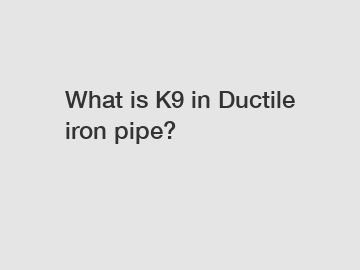What is K9 in Ductile iron pipe?
What is K9 in Ductile iron pipe?
When it comes to underground water supply systems, Ductile iron pipes are widely recognized for their strength and durability. These pipes are used to transport water to homes, businesses, and industries, ensuring a reliable source of water for various purposes. Within the world of Ductile iron pipes, you may come across the term "K9." What exactly does K9 mean in relation to Ductile iron pipes? In this article, we will explore the concept of K9 and its significance in the context of Ductile iron pipe systems.
To understand K9, we must first have a basic understanding of Ductile iron itself. Ductile iron, also known as nodular cast iron, is a type of iron that exhibits high ductility, hence the name. It is created by treating cast iron with very small amounts of magnesium or cerium, resulting in a greatly improved microstructure. This altered microstructure makes Ductile iron pipes more durable, flexible, and resistant to cracking compared to traditional cast iron pipes.

Now, let's delve into the meaning of K9. K9 is a class designation that classifies Ductile iron pipes based on their strength and thickness. The "K" stands for "Class," and the number represents the pressure rating of the pipe in units of bar. A higher K class indicates a pipe with greater strength and thickness, capable of withstanding higher pressure loads. For instance, a K9 Ductile iron pipe has a pressure rating of 9 bar, while a K7 pipe has a pressure rating of 7 bar.
The choice of K class for a Ductile iron pipe depends on the specific application and the requirements of the water supply system. Factors such as the depth of burial, traffic loads above the pipe, and the expected pressure within the system play crucial roles in determining the appropriate K class. For instance, if the pipe will be installed in an area with heavy traffic or deep burial, a higher K class will be required to ensure the pipe's structural integrity and prevent any potential damage.
K9 Ductile iron pipes are commonly used in municipal water supply systems where water pressure is relatively high. These pipes can effectively handle the demands of urban water distribution networks, ensuring a reliable and continuous flow of water to consumers. Their robustness makes them suitable for various applications such as water mains, fire hydrants, and industrial water supply lines.
One of the significant advantages of K9 Ductile iron pipes is their ability to withstand external loads. Underground pipes are subject to a variety of pressures due to external factors such as soil movement, traffic loads, and construction activities. K9 pipes have the necessary strength and durability to resist these imposed forces, reducing the risk of pipe failure and subsequent water supply disruptions.
Furthermore, K9 Ductile iron pipes exhibit excellent corrosion resistance. This is crucial in underground water supply systems as pipes are constantly exposed to the corrosive effects of soil, water, and other elements. The corrosion resistance of Ductile iron pipes is achieved through coatings and linings that protect the pipe's surface from chemical attacks, preventing any deterioration over time.
In conclusion, K9 in Ductile iron pipe refers to a class designation that denotes the strength and pressure rating of the pipe. These pipes are characterized by their superior strength, durability, and ability to withstand external loads. K9 Ductile iron pipes are commonly used in municipal water supply systems, where they deliver a reliable source of water to urban areas. Their corrosion resistance and robustness make them an ideal choice for various applications, ensuring a long-lasting and efficient water distribution network. When it comes to underground water supply systems, you can trust K9 Ductile iron pipes to provide the necessary strength and longevity for a dependable water flow.
If you are looking for more details, kindly visit Ductile Iron Pipe Prices, k12 ductile iron pipe, Ductile Iron Pipes And Fittings Manufacturers.
265
0
0

Comments
All Comments (0)